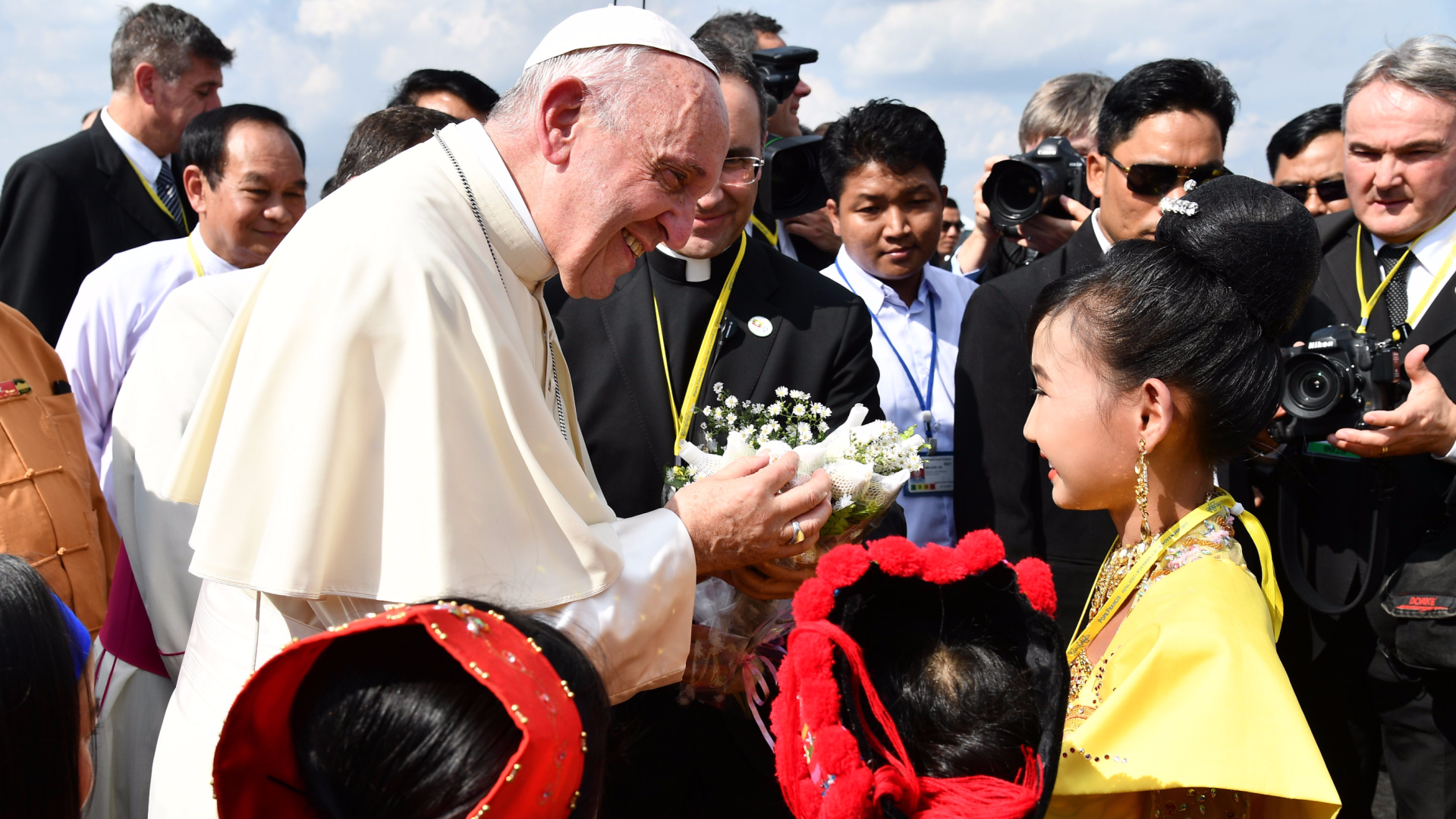Pope Francis landed in Myanmar on Monday to start his six-day visit to Southeast Asia, raising the hopes of Christians there that he will address the issues they face in the majority-Buddhist nation formerly known as Burma.
Among those welcoming the pontiff in Yangon were more than 7,000 ethnic Kachin from the conflict-torn state in northern Myanmar, who had travelled down for the occasion, according to Catholic news agency UCAN.
The predominantly Christian Kachin, together with the Karen ethnic minority, live in conflict zones along the country’s borders and have faced years of government oppression.
John Hong Khong, from Kachin, told UCAN they expected “to get peace through the Pope’s visit as we believe he will raise peace issues and push the country’s leaders for ending ethnic conflicts.”
Leading up to the visit, Myanmar’s Catholic Cardinal Bo said he hoped Pope Francis’ trip would “help heal the wounds of his country, especially for minorities under attack,” adding that the “Rohingya situation is a great tragedy [but] the country needs healing on various fronts.”
During his three days in Myanmar, the Pope will visit the current and former capitals, Nay Pyi Taw and Yangon, and meet, among others, the country’s leader—in all but title—Aung San Suu Kyi.
The Nobel Prize winner has come under pressure in recent months because of her handling of the Rohingya crisis. Since August more than 600,000 people belonging to the Rohingya Muslim minority have fled into neighbouring Bangladesh following attacks by the army which, according to the UN, amount to “ethnic cleansing”. The Pope is also due to visit Muslim-majority Bangladesh during this trip.
It is expected he will address the plight of the Rohingya, with some fearing that this might lead to repercussions for Myanmar’s Christians.
In October, two Kachin Baptist pastors who helped a journalist to photograph a Catholic church—apparently bombed by Myanmar’s army in 2016—were sentenced to two years in prison for their alleged support of the Kachin Independence Army.
Relationships between the Kachin and the military are strained not only by the conflict, but also by slow progress in identifying and prosecuting perpetrators of the many documented cases of sexual abuse by Myanmar troops in the region. Two Kachin Baptist women teachers were raped and murdered in February 2015, and no-one has ever been tried or convicted for their deaths.
During a visit to the UK parliament in 2016, Cardinal Bo said: “The majority of the Kachin, Chin … and a significant proportion of the Karen, are Christians—and over the decades of armed conflict, the military has turned religion into a tool of oppression.
“In Chin state, for example, crosses have been destroyed and Christians have been forced to construct Buddhist pagodas in their place…. At least 66 churches in Kachin state have been destroyed since the conflict reignited in 2011.”
In Karen, Christians have also been threatened by a spate of Buddhist nationalists illegally building pagodas on church grounds.
“Christianity is viewed by many as a colonial belief after the country was ruled by the British for a century until its independence in 1948. Likewise, the separation of church and state is considered a foreign imposition,” according to AP journalist Julhas Alam.
Around one-sixth of Myanmar’s Christians, who altogether account for around six percent of the population, are Catholics. According to Mariano Soe Naing, a spokesman for Myanmar’s Bishops’ Conference, “there are always challenges to stand up as Catholic and to have strong faith here,” and pressure comes in many different forms.
“To be honest, if you are a Christian in this country, you will never get promoted,” Mariano said. “There are no Catholics in the government administration or in any significant leadership positions.”
According to Benedict Rogers, a human rights activist, Myanmar has seen a “significant rise of religious intolerance, which has come from within society, although there’s evidence … that if not the military as a whole, then elements of the military-backed political parties are also involved in this.”
An example is the extremist Buddhist movement called “Ma Ba Tha” (Committee for the Protection of Race and Religion) which—so far—has mostly targeted Muslim groups in the country through hate speech, but this “has a knock-on effect on Christians as well,” Rogers says.
“Ma Ba Tha is not just anti-Muslim, it is Buddhist nationalist, so Christians could come increasingly into its focus,” according to Thomas Muller, analyst for the World Watch Research unit of Christian charity Open Doors.
A census, conducted in 2014, showed a rise in the number of Christians (6.2 percent, up from 4.9 percent in 1983) and a fall in the popularity of Buddhism, although 88 percent still identified with the country’s most popular religion.
The delayed release of the census by nearly two years was, some commentators said, to avoid a backlash from nationalists anticipating a sharp rise in non-Buddhist religions, which they feel threaten Myanmar’s Buddhist identity.
Myanmar is No. 28 on Open Doors’s 2017 World Watch List of the 50 countries where Christians are most under pressure for their faith.









